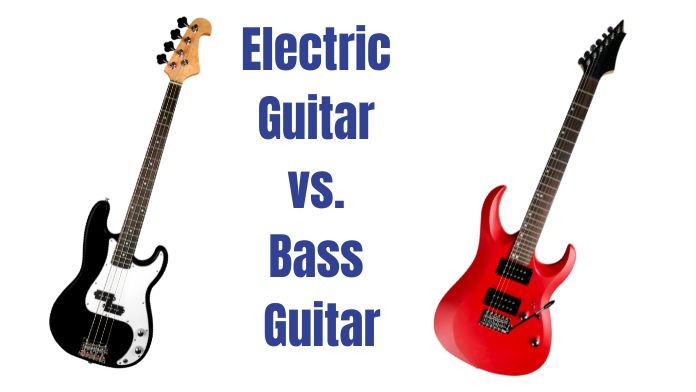Who Is The Best At Electric Guitar vs. Bass Guitar
If you’re a music enthusiast or aspiring musician, the eternal debate of electric guitar vs. bass guitar has probably crossed your mind more than once. Both instruments are iconic in their own right, and each has its dedicated following. In this user-friendly exploration, we’ll dive deep into strings, frets, and rhythms to determine which instrument reigns supreme. Whether you’re a seasoned musician looking to expand your repertoire or a beginner deciding where to start, this guide will help you make an informed choice.
Anatomy of the Instruments
To truly appreciate the differences between electric guitars and bass guitars, let’s start by dissecting their basic structures.
Electric Guitar: The electric guitar is versatile with six strings, though seven and even eight-string variants exist. It boasts various sounds, from gentle strums to blistering solos. Popular among rock, blues, jazz, and pop musicians, it’s renowned for its ability to create melodies, riffs, and chords.

Bass Guitar: In contrast, the bass guitar typically features four strings, though five-string basses are also common. The bass guitar’s primary role is to provide a song’s rhythmic and harmonic foundation. Bassists groove alongside drummers, forming a tight rhythm section. This instrument is the heartbeat of many music genres, including funk, reggae, metal, and jazz.
The Sound Factor
When comparing electric and bass guitars, their sound is undoubtedly a crucial factor to consider.
Electric Guitar: Electric guitars offer a wide sonic palette thanks to their multiple strings and various pickup configurations. You can achieve clean, distorted, or overdriven tones, making it versatile for lead or rhythm playing. Its melodic capabilities are unmatched, making it perfect for solos and intricate chord progressions.
Bass Guitar: Bass guitars, on the other hand, excel at producing deep, low-frequency tones that anchor the music. They create the groove and provide a steady rhythm, giving songs their unique feel. While bassists can play melodic lines and solos, their primary role is ensuring the band maintains tight, rhythmic cohesion.

However, despite these differences in sound, both instruments have their charm and essential roles in music.
Playing Styles
Let’s explore how playing styles differ between electric guitarists and bassists.
Electric Guitar: Electric guitarists are often the spotlight performers. They engage audiences with blistering solos, intricate fingerpicking, and captivating melodies. Their instrument’s higher pitch allows for more prominent melodic expression, making it ideal for guitar heroes like Jimi Hendrix and Eric Clapton to shine on stage.
Bass Guitar: While not typically front and center, Bassists play an equally crucial role in a band’s dynamics. Their playing is focused on establishing the rhythm and groove, emphasizing the importance of timing and precision. Bassists like Flea from the Red Hot Chili Peppers and Geddy Lee from Rush are renowned for their rhythmic prowess.
Nonetheless, both electric guitarists and bassists are indispensable components of any band.
Tuning and Strings
Understanding the tuning and number of strings on each instrument can significantly influence your choice.
Electric Guitar: Electric guitars typically use a standard tuning of E-A-D-G-B-E, starting from the thinnest string (high E) to the thickest (low E). This tuning allows for a wide range of chords and melodic possibilities. Some players experiment with alternative tunings to achieve unique sounds.
Bass Guitar: Bass guitars generally use a standard tuning of E-A-D-G, starting from the thickest string (low E) to the thinnest (high G). This tuning emphasizes the lower frequencies, giving bassists the foundation to create powerful rhythms. Some bassists opt for a five-string bass, which adds a low B string, expanding the instrument’s tonal range.
While the tuning and number of strings may seem like minor details, they significantly impact how each instrument is played and the sounds they can produce.
Versatility and Genre Preferences
The choice between electric and bass guitar often depends on your musical preferences and the genres you want to explore.
Electric Guitar: Electric guitars are versatile and find a home in various music genres. From blues to metal, rock to jazz, the electric guitar is a go-to instrument for many musicians. If you aspire to be a lead guitarist or are drawn to intricate melodies, this might be your instrument of choice.
Bass Guitar: while less versatile in genres, Bass guitars are indispensable in specific musical styles. If you’re into funk, reggae, or metal, the bass guitar’s thumping rhythms and deep tones will be right up your alley. It’s also an excellent choice if you prefer being part of the rhythm section, driving the song’s pulse.
Ultimately, your preferred musical style will heavily influence whether you lean toward the electric or bass guitar.
Unique Variants – The 4-String Cigar Box Guitar and 5-String Bass Tuner
Before concluding, let’s quickly examine some unique variants that pique your interest.
4-String Cigar Box Guitar: If you’re seeking something truly unconventional, consider the 4-string cigar box guitar. It’s a handmade, DIY instrument with a distinctive, raw sound. While it may not be the instrument of choice for mainstream music, it’s a testament to the creativity and resourcefulness of musicians.
5-String Bass Tuner: For bassists looking to expand their tonal range, a 5-string bass is worth exploring. The additional low B string can add depth and richness to your basslines, giving you even more versatility within the realm of bass playing.
These unique variants may not be the first choice for most musicians, but they demonstrate the diverse world of stringed instruments.
Which Instrument Should You Choose?
Which instrument then ought to be learned initially? Consider your interests first. What sounds like more fun to play? If you still need clarification, look at our points below.
Until they are older, younger children may struggle to grasp and play the bass due to its size (the thicker strings might be challenging to press down). It may be simpler for novices to start with the guitar.
Guitarists who enjoy being in the spotlight are usually gifted with solos and memorable passages in their tunes. But bass might be more your style if you only want to study an instrument for pleasure and to back a band.
You will, however, only get as much use out of it as you put in, just like any other instrument! Whichever instrument you choose, getting “good” will take a lot of practice. Who says you can only learn one instrument? Keep in mind that you may always switch from learning one to another. Much of what you learn will be applicable.
FAQ
What Is The Difference Between a Bass Guitar And An Electric Guitar?
While these instruments appear very similar, they have some significant differences. Bass guitars are larger and heavier than electric guitars. Basses have fewer strings, are easier to learn, and require fewer techniques to get started. Guitars have more strings and are more difficult to understand initially.
Are Bass Strings Sharper Than Guitar Strings?
But at the same time, bass strings are not as sharp and hard as guitar strings because of their bigger size. Four lower strings of the guitar are tuned to the same notes as four strings of the bass guitar, E, A, D, G. But the strings of a bass guitar are tuned 1 octave lower than the strings of a regular guitar.
Is A Bass a Good Instrument?
You can only have a good band with a good bass player, but a weaker guitar player can sometimes be masked. So, even though the instrument is less diverse in terms of different functions and tone-shaping options, the bass is an underrated foundation of every music genre these days.
Conclusion
There is no clear winner in the ongoing electric guitar vs. bass guitar battle. Both instruments offer their unique set of advantages and challenges. Your choice ultimately depends on your musical aspirations, genre preferences, and playing style.
Electric guitars shine in the spotlight with melodic capabilities, while bass guitars provide the foundation to keep the groove alive. The number of strings, tuning, and even unique variants like the 4-string cigar box guitar or 5-string bass tuner can further tailor your instrument to your needs.
So, whether you choose to strum the chords of an electric guitar or lay down the funky basslines of a bass guitar tuning, remember that both have their place in the world of music. Embrace your chosen instrument, practice diligently, and let your passion for music guide your musical journey.


Pingback: Gifts for Guitar Players: A Symphony of Thoughtful Ideas
Pingback: The Complete Guide to Choosing the Perfect Jasmine Guitar for Your Playing Style
Pingback: Stratocaster vs Telecaster: Unveiling the Guitar Dilemma
Pingback: How Long Does It Take to Learn Guitar
Pingback: How Much Is An Electric Guitar - Acoustic Guitar Supply
Pingback: Easy Guitar Love Songs for Beginners: Strumming Your Way to Romance
Pingback: How to Master Bass Guitar: A Comprehensive Guide for Beginners and Enthusiasts
Pingback: How to Learn to Play Bass Guitar for Free
Pingback: How to Humbucker vs Single Coil: A Comprehensive Guide
Pingback: Where Are Charvel Guitars Made
Pingback: Unveiling the Musicman Stingray: A Symphony of Excellence